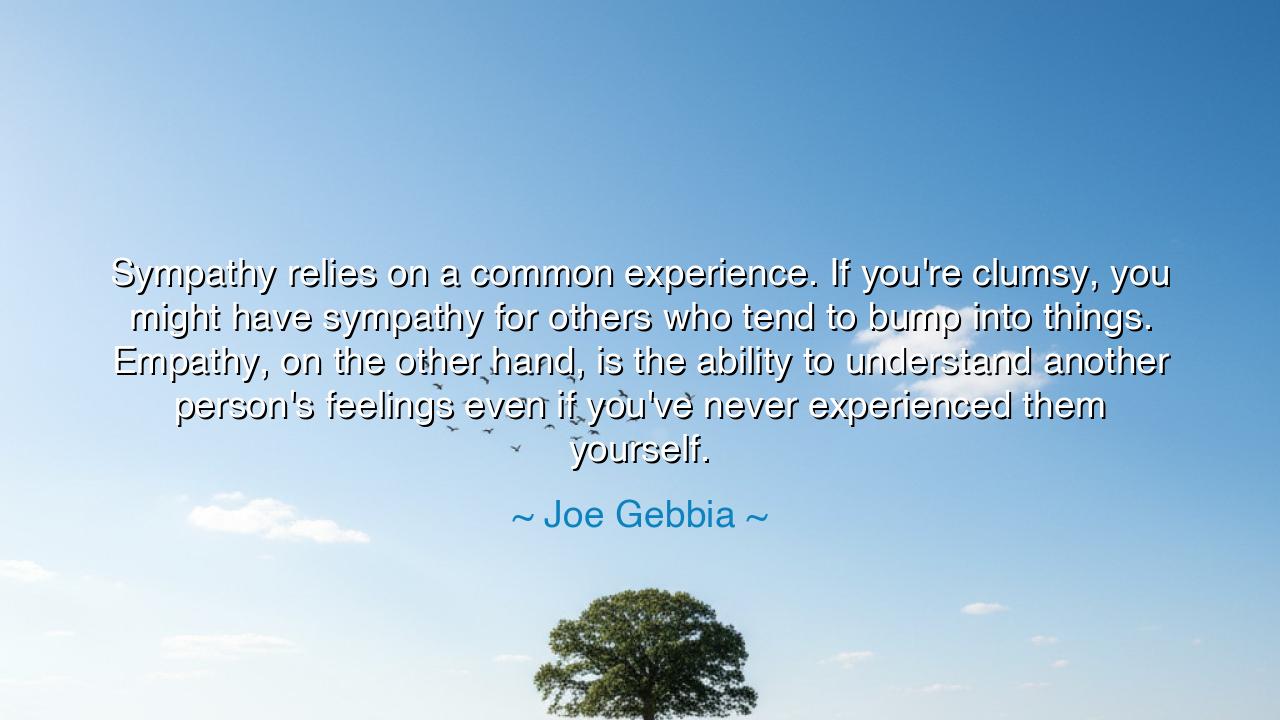
Sympathy relies on a common experience. If you're clumsy, you
Sympathy relies on a common experience. If you're clumsy, you might have sympathy for others who tend to bump into things. Empathy, on the other hand, is the ability to understand another person's feelings even if you've never experienced them yourself.






Children, gather close, for I speak of two forces that flow through the human heart—sympathy and empathy. In the words of Joe Gebbia, we find a deep understanding of the distinction between these two emotions: "Sympathy relies on a common experience. If you're clumsy, you might have sympathy for others who tend to bump into things. Empathy, on the other hand, is the ability to understand another person's feelings even if you've never experienced them yourself." These words, though simple, speak to the very core of what it means to be human—how we connect with others, how we relate to their joys and sufferings, and how we grow in our understanding of the world through the experiences of others.
Sympathy is the emotion that arises when we recognize another’s suffering because we have shared a similar experience. It is born of a common bond, of knowing what it feels like to be hurt or lost. Think, children, of Hercules, the great hero of ancient mythology, who, in his many trials, encountered suffering that made him empathetic to the struggles of others. In his moments of greatest trial, when he felt the weight of the world upon his shoulders, he could look to those around him and understand their pain, for he too had known it. His sympathy was rooted in his shared experience with others, and it shaped his ability to connect with them.
Yet, empathy—the higher path—is not bound by shared experience. It is the ability to understand the emotions of others even when we have never walked the path they walk. It is the vision to see someone else’s suffering not from the lens of our own experience, but through the lens of their own heart. Consider, children, the great leaders of history, such as Abraham Lincoln, who, though he had not personally suffered the horrors of slavery, fought with unwavering conviction for the freedom of others. His empathy for the enslaved people was not born from his own experiences, but from his deep understanding of their plight. He saw their suffering, not with pity, but with an awareness of their humanity and dignity, and sought to alleviate their pain by standing in solidarity with them.
This, children, is the power of empathy—it asks us to reach beyond ourselves, to look at the world not through the lens of our own experiences, but through the eyes of those we seek to help. The ancient philosophers, such as Socrates, taught that wisdom is not found in knowing the world as it is for us, but in understanding the world as it is for others. To know someone’s heart, to feel their struggles even without having experienced them, is the greatest form of wisdom and connection. It is through empathy that we break down barriers, not just between people, but between cultures, nations, and hearts.
Now, children, think of the mighty Odysseus, who, after years of wandering, returned home only to find his kingdom in peril. He did not act merely out of sympathy for his people, knowing their suffering through his own. Rather, he acted with empathy, understanding the needs of his kingdom and his family, and sought to restore peace and prosperity not just through his own strength, but through his understanding of the human condition. Odysseus’s actions were not based solely on the trials he had faced but on his deep understanding of the pain of those around him, which gave him the strength to lead them with wisdom and compassion.
The lesson of Joe Gebbia’s words is clear: though sympathy is a powerful force that connects us through shared experiences, empathy is the bridge that unites us in our differences. It teaches us that to truly understand another’s pain, we must first step beyond our own perspective, to imagine life through their eyes. This is a path that requires courage, as it asks us to face not just the suffering of others, but to feel it as our own, even if we have never lived it. But through empathy, we do not just feel for others—we are moved to act in ways that uplift, that heal, that bring about true change.
So, children, let this lesson guide you in all your relationships. When you are faced with the suffering of others, ask yourself: Is this my suffering too, or do I reach beyond myself to understand theirs? In the world, there will be many moments when you can either sympathize with someone’s pain or truly empathize with it. When you choose empathy, you choose the path of wisdom and compassion. You choose to bridge the gaps between hearts, to see the world not through the lens of your own experience, but through the lens of the shared human condition. This is the path to true understanding—and through understanding, you will find the strength to help those around you in ways that are not just kind, but transformative.
Go forth, children, with empathy in your hearts. Walk in the world not just as observers of others’ suffering, but as those who seek to understand, who feel deeply for the pain of others, even when it is not your own. Let your actions be guided not by pity, but by the power of knowing that true connection comes not from shared pain, but from the shared human spirit that binds us all.






AAdministratorAdministrator
Welcome, honored guests. Please leave a comment, we will respond soon